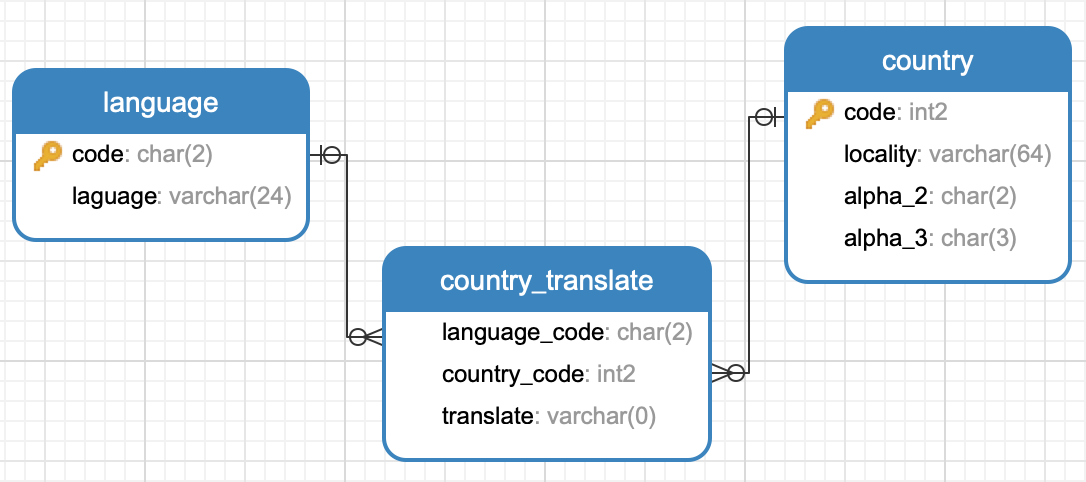Answer the question
In order to leave comments, you need to log in
Error "No identifier specified for entity" how is it treated?
There is a database:

CREATE TABLE language (
"code" char(2) PRIMARY KEY, -- čüčéą░ąĮą┤ą░čĆčé ISO 639-1
"laguage" varchar(24) NOT NULL UNIQUE -- ąØą░ąĘą▓ą░ąĮąĖąĄ ąĮą░ ą╗ąŠą║ą░ą╗čīąĮąŠą╝ (čĆąŠą┤ąĮąŠą╝) čÅąĘčŗą║ąĄ
);
-- ą×čüąĮąŠą▓ąĮčŗąĄ čÅąĘčŗą║ąĖ čüą░ą╣čéą░
INSERT INTO language VALUES
('en', 'English'),
('ru', 'ąĀčāčüčüą║ąĖą╣'),
('uk', 'ąŻą║čĆą░茹Įčüčīą║ą░');
CREATE TABLE country (
"code" smallint PRIMARY KEY, -- ISO 3166-1 numeric
"locality" varchar(64), -- ąĮą░ąĘą▓ą░ąĮąĖąĄ čüčéčĆą░ąĮčŗ (ąĮą░ čĆąŠą┤ąĮąŠą╝ čÅąĘčŗą║ąĄ čüčéčĆą░ąĮčŗ)
"alpha_2" char(2) NOT NULL UNIQUE, -- ISO 3166-1 alpha-2
"alpha_3" char(3) NOT NULL UNIQUE -- ISO 3166-1 alpha-3
);
CREATE TABLE country_translate (
"language_code" char(2) REFERENCES language,
"country_code" smallint REFERENCES country,
"translate" varchar NOT NULL
);@Data @Entity @Table
public class Language {
@Id
@Column(columnDefinition = "CHAR(2)")
private String code; // ąÜąŠą┤ čÅąĘčŗą║ą░ ą┐ąŠ čüčéą░ąĮą┤ą░čĆčéčā ISO 639-1
@Column(unique = true, nullable = false, length = 24)
private String laguage; // ąøąŠą║ą░ą╗čīąĮąŠąĄ ąĮą░ąĘą▓ą░ąĮąĖąĄ čÅąĘčŗą║ą░
}@Data @Entity @Table
public class Country {
@Id
@Column(columnDefinition = "smallint")
private int code; // ISO 3166-1 numeric
@Column(nullable = false, unique = true, length = 64)
private String locality; // ąøąŠą║ą░ą╗čīąĮąŠąĄ ąĮą░ąĘą▓ą░ąĮąĖąĄ čüčéčĆą░ąĮčŗ (ąĮą░ čĆąŠą┤ąĮąŠą╝ čÅąĘčŗą║ąĄ čüčéčĆą░ąĮčŗ)
@Column(columnDefinition = "char(2)", unique = true, nullable = false)
private String codeAlpha2; // ISO 3166-1 alpha-2
@Column(columnDefinition = "char(3)", unique = true, nullable = false)
private String codeAlpha3; // ISO 3166-1 alpha-3
@OneToMany(mappedBy = "country")
private Set<CountryTranslate> translate = new HashSet<>();
}@Data @Entity @Table
public class CountryTranslate {
@ManyToOne
private Language language;
@ManyToOne
// @JsonIgnoreProperties("translate")
private Country country;
@Column(nullable = false)
private String translate;
}@IdClass, but honestly I didnŌĆÖt understand anything because there @EmbeddedIdis @MapsIdno sensible material in Russian
Answer the question
In order to leave comments, you need to log in
It was necessary to make a composite key.
@Data @Entity @Table
public class Country {
@Id
@Column(columnDefinition = "smallint")
private int code; // ISO 3166-1 numeric
@Column(nullable = false, unique = true, length = 64)
private String locality; // ąøąŠą║ą░ą╗čīąĮąŠąĄ ąĮą░ąĘą▓ą░ąĮąĖąĄ čüčéčĆą░ąĮčŗ (ąĮą░ čĆąŠą┤ąĮąŠą╝ čÅąĘčŗą║ąĄ čüčéčĆą░ąĮčŗ)
@Column(columnDefinition = "char(2)", unique = true, nullable = false)
private String codeAlpha2; // ISO 3166-1 alpha-2
@Column(columnDefinition = "char(3)", unique = true, nullable = false)
private String codeAlpha3; // ISO 3166-1 alpha-3
@OneToMany(mappedBy = "countryTranslatePK.country")
private Set<CountryTranslate> translate = new HashSet<>();
}
...
@Data @Entity @Table
public class Language {
@Id
@Column(columnDefinition = "CHAR(2)")
private String code; // ąÜąŠą┤ čÅąĘčŗą║ą░ ą┐ąŠ čüčéą░ąĮą┤ą░čĆčéčā ISO 639-1
@Column(unique = true, nullable = false, length = 24)
private String laguage; // ąøąŠą║ą░ą╗čīąĮąŠąĄ ąĮą░ąĘą▓ą░ąĮąĖąĄ čÅąĘčŗą║ą░
}
...
@Data @Entity @Table
public class CountryTranslate {
@EmbeddedId
private CountryTranslatePK countryTranslatePK;
@Column(nullable = false)
private String translate;
}
...
@Data @Embeddable
public class CountryTranslatePK implements Serializable {
@ManyToOne @JoinColumn(name="language_code")
private Language language;
@ManyToOne @JoinColumn(name="country_code")
private Country country;
}CountryTranslate is missing a field with an annotation @Id.
Everyone @Entityshould have it
Didn't find what you were looking for?
Ask your questionAsk a Question
731 491 924 answers to any question